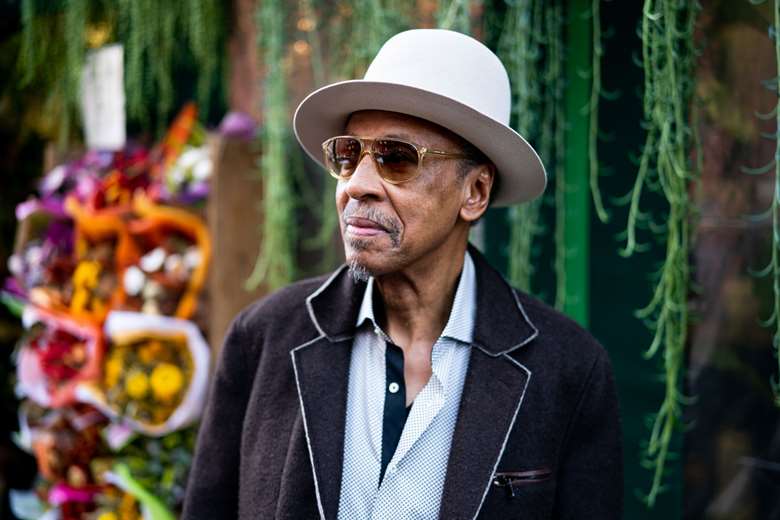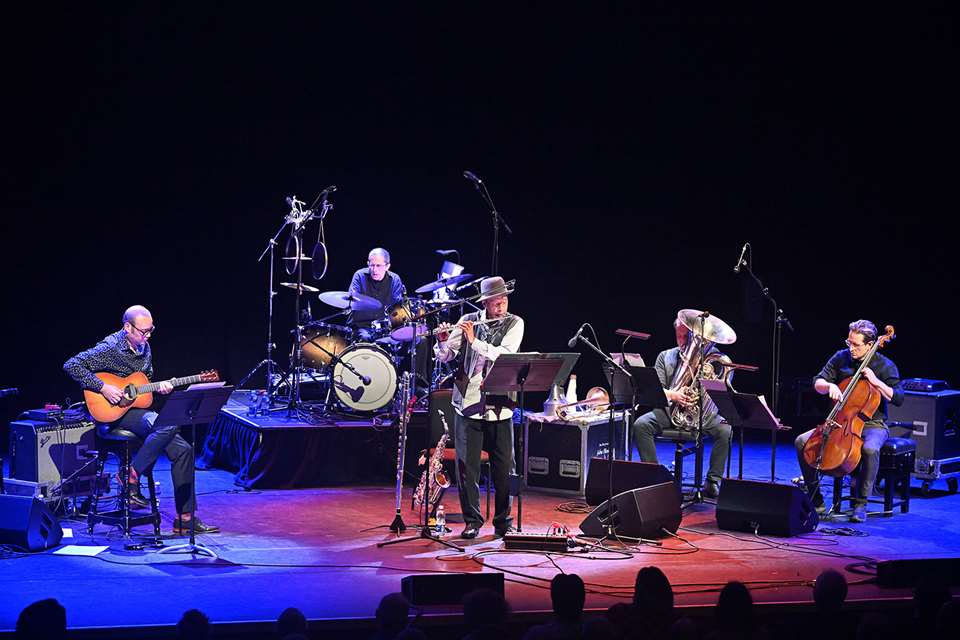Henry Threadgill interview: “Yes, I do want to change… I don’t see any reason to go backwards”
Kevin Le Gendre
Wednesday, January 11, 2023
American composer, saxophonist and flautist Henry Threadgill is a true giant of post-war jazz, marrying poetry and writing with music to create a unique vision; and as a founding member of Chicago’s AACM he’s been in the vanguard of progressive music for the past six decades

Sound and vision is a meaningful combination. After all, the eye and the ear often work as one. When Henry Threadgill presented the dual shows One and The Other One in New York earlier in 2022, the audience may have been intrigued by his own exploration of these senses, for the ambitious multimedia project featured a band, pre-recorded spoken word, live recital and still images. An ordinary gig this was not.
The performance was both logistically complex and exciting for its presentation of many facets of Threadgill’s world, but its breadth of content comes from a long way back.
“I’ve always been interested in a lot of things. A lot of installation work resonates with me, it’s very important in terms of what my thinking is about,” he says on a clear line to his home in New York. “And photography is something that I’ve been interested in for years. I’m not a photographer by any means, but I did capture what I needed to for this project. It’s taken years to get into a position to do all this.”
The final sentence is said with a measured authority, a timely reminder that the 79 year-old composer-saxophonist-flautist has a lifetime of endeavour which precedes this latest work. The award of a Pulitzer Prize For Music in 2016 may well have given Threadgill the kind of kudos that is priceless in the world of contemporary music, but of no less importance is the fact that his five-decade development has been one of consistent and uncompromising originality that justifies his standing.
He has formed many notable ensembles, each one with stellar players. The mid-1970s trio Air paired him with drummer Steve McCall and bassist Fred Hopkins; the 1980s Sextett stood out for its twin percussion station of John Betsch and Pheeroan akLaff; the 1990s groups Very Very Circus and Make A Move featured, among many others, guitarists Brandon Ross and Ed Cherry, cellist Deirdre Murray and pianist Myra Melford.
Since the early 2000s, Threadgill has led one of his most adventurous outfits, Zooid, whose steady stream of releases, which include Up Popped The Two Lips, This Brings Us To Volume 1 and 11 and In For A Penny In For A Pound have helped to establish Pi Recordings as one of the cutting-edge imprints in creative music.
Watch Henry Threadgill's Zooid:
This body of work has seen Threadgill achieve the ultimate goal for any artist: he has created his own language, a beguiling and enticing signature in which pulse can be both nailed down and opened up while dark and light timbres slide in provocative push and pull, and typical hierarchical notions of topline and bottom end evaporate, so that tubas might occupy the foreground along with reeds or strings. The result is as much avant-groove as avant-garde. Every venture is borne of exacting rigour and considered purpose.
“There’s always a vision… I don’t just make up bands,” he says. “I have an ensemble as long as I can get joy from it musically. There’s two factors… as long as I have the attention of the players it works. If musicians are not giving 100 per cent I don’t really need that. The other factor is that once I’ve exhausted my compositional practise I move on to another one. I just try to imagine the next thing I’m gonna do. I’ve been fortunate enough to be able to do that, to keep imagining the next thing.”
Given that focus, it is not surprising that Threadgill has made relatively few appearances as a sideman over the years. Yet in the past decade he has recorded with Wadada Leo Smith and Jack DeJohnette; all three being members of the Association For The Advancement Of Creative Music (AACM), the cohort of musicians that came together in Chicago in the mid 1960s in order to develop new work rather than settle into orthodoxy of any kind. The likes of Muhal Richard Abrams, George Lewis, Anthony Braxton, Steve McCall and Roscoe Mitchell were just a few of the other key figures who emerged from that cornucopia, which as Threadgill points out, was predicated as much on acceptance of others as it was on assertion of oneself.
“There were a lot of people at different times because not everybody could stay…. because they didn’t have the discipline to be democratic, they didn’t wanna allow people to be themselves,” he notes. “You had to be a servant to everybody that got up in front of you. You had to give 100 per cent, you could not put your attitudes or opinions on somebody else’s music because it was difficult or you didn’t like it. You had to find a way to serve them 100 per cent, that’s why it came down to only so many people.”

The AACM
These days there is an AACM chapter in New York, which has also been Threadgill’s home since the mid 1970s; but his birthplace, Chicago, is a subject on which he is forthcoming. While ‘early jazz’ heroes such as King Oliver and Louis Armstrong, and later Sun Ra, put the city on the cultural map, blues legends Howlin’ Wolf and Muddy Waters have a special place in Threadgill’s heart. But it is his evocation of an early childhood experience that actually gives one of the biggest clues to his subsequent development as a creative being in the broadest sense. It hinges on a part of the ‘Windy City’ he likens to a landmark in London that draws crowds every weekend.
“Is it Hyde Park Corner that you have there? Is that what it’s called?” he asks tentatively.
“You mean Speakers’ Corner in Hyde Park?” I clarify.
“Yeah, that’s it. Well, we had something like that growing up. My grandfather used to take us there on Sunday, to Washington Park, on the South Side where I grew up. It’s the largest park on the South Side; it’s comparable to Central Park in Manhattan. In Washington Park, people would talk about all kinds of things, ideas, theories etc. But their inventiveness with words is what got me… the freedom they had with words is what struck me more than anything. And I would always like to go there and listen to see what people were doing with words. I think that’s where I first learned that, that’s where it started in my life. I kind of continued… after that came my interest in poetry.
“Poetry, you know, can mean a lot of things… but it was really that experience on Sunday listening to all these different people playing and improvising with words and subject matter I just… I was totally fascinated with that as a kid. By the time I got to college I was really into poetry, all the great poets, from America, from India, from everywhere. I just liked poetry…. Yusef Komunyakaa, Archibald MacLeish and so on, there are just so many great poets. They’re important to my own creativity.”
Nobody’s playing a classical march because we already got too many problems just trying to march!
Another iconic writer, one of the finest the Caribbean has ever produced, also came directly into Threadgill’s orbit. “Derek Walcott, he’s one of my favorites,” Threadgill gushes. “I met him in Trinidad. Derek had a group that had everything in it… dancers, singers, players, and I was with that group. I was really crazy about his work, I’m telling you. I did a tour in Europe with him…. a small ensemble with me, Jose Davila on tuba, Ted Daniel on trumpet, Leroy Jenkins on violin, Thurman Baker on drums, and my wife at the time was singing. We did all of Derek’s poetry with music.”
Producing sounds to match the words of Walcott, the Saint Lucian writer who was awarded the Nobel Prize For Literature in 1992, was of untold stimulus for Threadgill, as a man whose early imagination had been decisively fired by the extempo oratory he saw in his native Chicago. While not publishing verse himself, the composer has shown consistent linguistic verve over the years, above all in song and album titles that can be as wry and pithy as they are cryptic and thought-provoking, with Everybody’s Mouth Is A Book perhaps the most deeply symbolic expression of his worldview. This could stand as a statement of democracy, a salute to Washington Park’s ‘super signifiers’ as much as it is a gentle swipe at any putative 'literary gatekeepers' who determine what constitutes a good read and what doth not.
Threadgill also points out that a sojourn in the Caribbean impacted him quite considerably from a broader musical perspective. In the early 1970s he spent time in Venezuela – and would later record with musicians from that country – before hopping to Trinidad, where he had the opportunity to work with renowned calypso artists such as Andre Tanker and The Mighty Sparrow. Perhaps more importantly, Threadgill was able to immerse himself in the experience of carnival. Which meant that was often the only horn player surrounded by steel drummers on a flatbed truck that was part of a procession through the streets of Port Of Spain. Upon his return to America, he took up a commission to write original music for a country & western show in Boston.
“Yeah, that was kind of different,” he says with a dry chuckle. In other words, there was a direct engagement with popular culture of which he is anything but dismissive. The gigs he played in ‘the islands’ have a special place in his heart because they formed a kind of organic continuum with his formative years in Chicago where he worked with a wide range of parade bands that reflected the ethnic diversity of the city, which meant blasting out Mexican mariachi tunes and Polish polkas. The very idea of ‘street noise’, found far from official canons or establishments, is something which the artist values. “For a composer it adds something to your language… you learn a lot when music comes from the folk and the daily life tradition, not the complex so-called classical world. Nobody’s playing a classical march because we already got too many problems just trying to march!”
Which makes the evolution of Henry Threadgill one of the most fascinating in modern music. Long years of experiment and growth have seen his music capture the imagination for its endless structural ingenuity, from a wily use of counterpoint to an intervallic system which gives players a range of note choices as well as written parts, thus lending to live performances a kind of tremulous electricity that goes far beyond the paradigm of solos on chord changes. Switches are being continually flicked.
And worlds appear to collide. Threadgill’s love of orchestras has led him to deploy instruments such as tuba, cello, violin and latterly bassoon, yet drum kit and guitar continue to play a key role, and, for all its harmonic idiosyncrasy, his music still has surges of heavy funk and weary blues because these are essential parts of his identity as a Chicagoan. The wide range of conceptual elements in Threadgill’s songs, not to mention the salty irony, left of centre humour and sharp, incisive socio-political commentary make him a unique figure, whose focus firmly remains not so much on past achievements as on future possibilities. The search for the new does not get old.
“Yes, I do want to change,” he says calmly. “I don’t see any reason to go backwards.”
This interview originally appeared in the November 2022 issue of Jazzwise magazine. Never miss an issue – subscribe today
